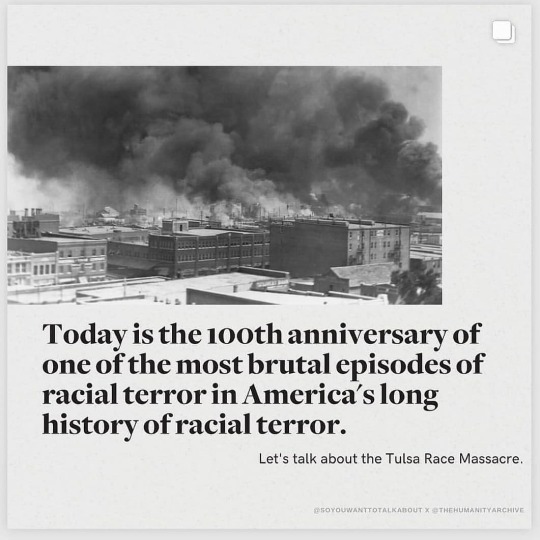#thetulsamassacre
Photo

Repost: loveelly11 “If we ignore the history upon which our society and the systems we live within have been built, we are doomed to repeat the same cycles of racism and destruction.” #100yearssincethetulsamassacre #tulsaracemassacre #1921tulsaracemassacre #weremember #thetulsamassacre #blackwallstreet #1921 @soyouwanttotalkabout @thehumanityarchive #blackhistory #oklahomahistory #tulsahistory #tragedy #neverforget https://www.instagram.com/p/CPjk9G1AREG/?utm_medium=tumblr
#100yearssincethetulsamassacre#tulsaracemassacre#1921tulsaracemassacre#weremember#thetulsamassacre#blackwallstreet#1921#blackhistory#oklahomahistory#tulsahistory#tragedy#neverforget
6 notes
·
View notes
Text
100 Years Later - The Tulsa Massacre
One hundred years ago in Tulsa, Oklahoma, a coordinated White mob used extreme violence to resolve what they believed to be a violation of a vain belief system they held so dear. In the full view of the All-Seeing, this mob avenged their shape-shifting idols by pointing and shooting, raining turpentine bombs from the air, and doing whatever else they could to inflict pain and death on a community of Black folks who dared to strive, build up their own enterprises, and live with dignity and self-respect.
Not even sixty years after emancipation, an enterprising group of Black Americans built a vibrant community that was economically self-sustaining. The heart of this community was a strip of Greenwood Avenue that was intersected by Archer and Pine Streets. According to multiple accounts, the businesses ranged from restaurants and supermarkets to movie theatres, banks, and law offices. The business community in Tulsa became known as Black Wall Street and was even praised by W.E.B. Du Bois for being a Black community that was “so highly organized” with “established stores and business organizations.”
Considering the scale of the violence, it is clear that the success of this community inspired a deep rage among many in White Tulsa. Regardless of the events that were said to have provoked such a violent response, it is quite obvious that large-scale violence was inevitable. A motivated collective in Tulsa was simply not going to allow Black Wall Street to stand. With this in mind, it is critical for the fair-minded to think deeper about the moral implications of what unfolded in Tulsa from May 31st to June 1st in 1921.
Social scientists have documented and analyzed for some time now the connections between social ideology, social beliefs, and social action. Typically, there is relative order and peace when these three elements are aligned and social turmoil when there is misalignment. So, when ideas and beliefs about Black inferiority become rooted in your mind and heart and a thriving Black business community is evident before your eyes, the White and insecure are faced with the choice to either abandon their alabaster calf or to make war on its behalf. Clearly, the White citizens of Tulsa chose war.
The Tulsa Massacre, and the many other instances of thriving Black communities being attacked for daring to strive economically and live with dignity, is vitally important to amplify given how it slices through the ultimate hollowness of conventional white ideology. On so many occasions, we hear the sentiments of Black people needing to “pull themselves up by the bootstraps” and to “succeed based on their own merits.” This sentiment works as long as Black people remain on the bottom, but when ‘the bluff’ is called through Black economic success and self-determination, much anger ensues due to the fealty paid to the alabaster calf residing in the heart.
Unfortunately, the alabaster calf continues to live on. It is avenged when a Black man reaches the highest level of office. It is avenged when Black people shout ‘Black Lives Matter.’ It is avenged when Black people turn out to the polls to vote. Whether 400 years ago, 100 years ago, or a year ago, Black people continue to face the brunt of an idolatrous belief system that sees them as subhuman, and cannot rest until this evil characterization of human reality is made concrete. And our White brothers and sisters who do not bow before the alabaster calf are much too comfortable with the flock who do and the actions they undertake. If it is our sincere desire to move beyond this racial muck, we need more Moses-like figures to arise in White America and less opportunist Aarons rearing their heads in Black America.
I’ll conclude with a quote from survivor Viola Ford Fletcher:
“…I will never forget the violence of the White mob when we left our home. I still see Black men being shot, Black bodies lying in the street. I still smell smoke and see fire. I still see Black businesses being burned. I still hear airplanes flying overhead. I hear the screams, I still live with the massacre every day… I’m asking that my country acknowledge what has happened to me. The tremors, the pain, and the lost and I ask the survivors and descendants to be given the chance to seek justice.”
4 notes
·
View notes